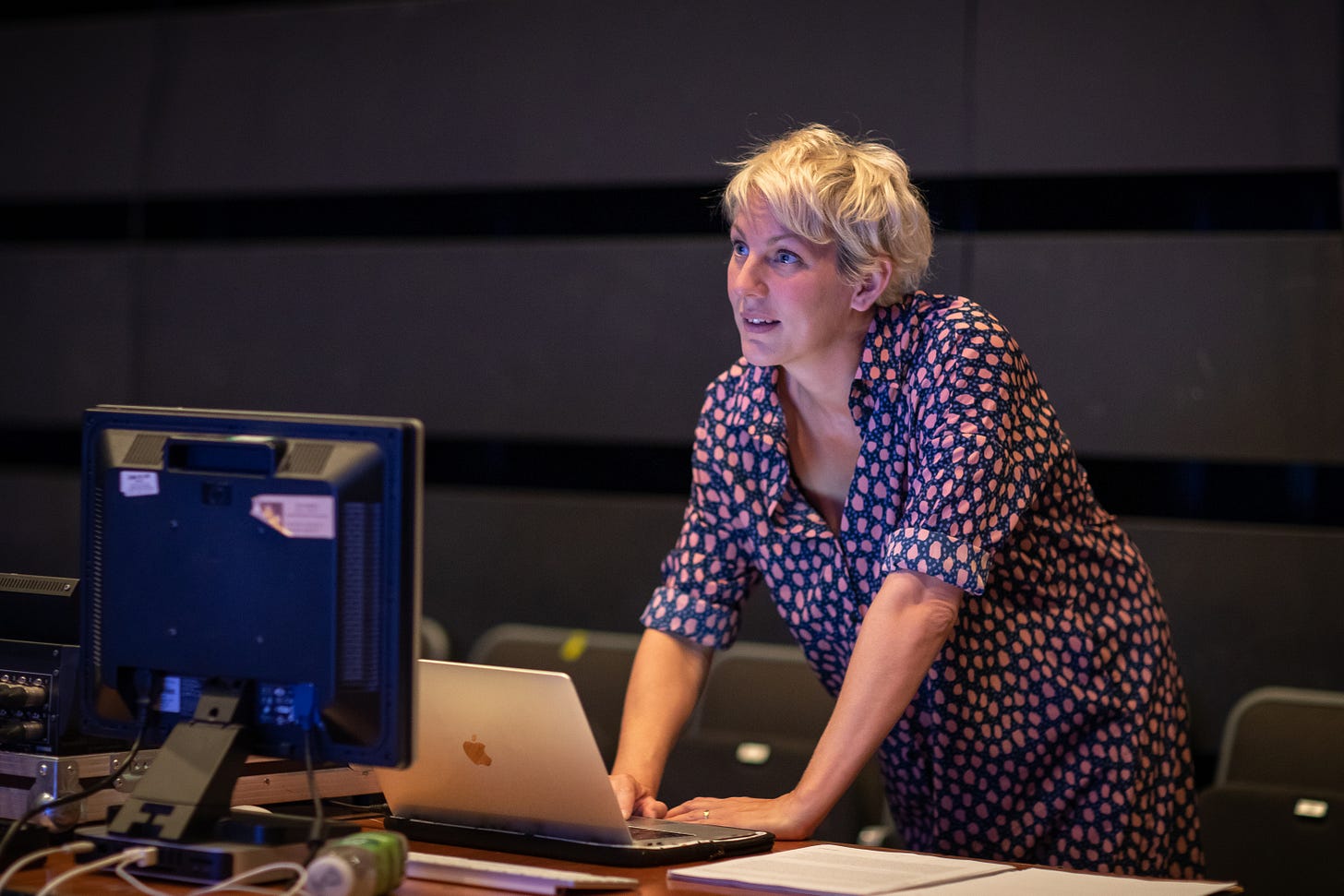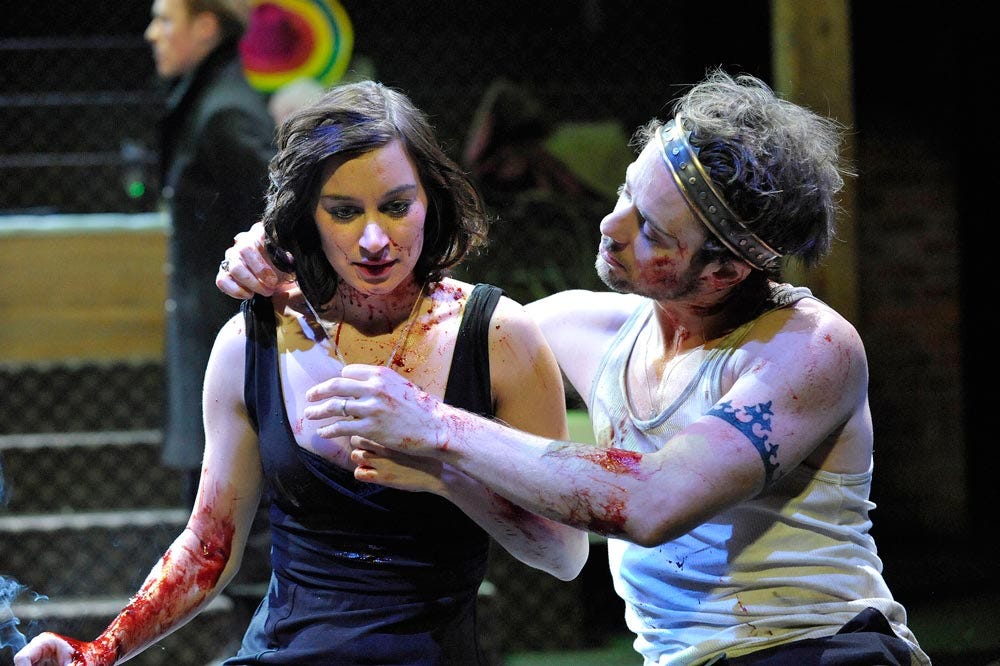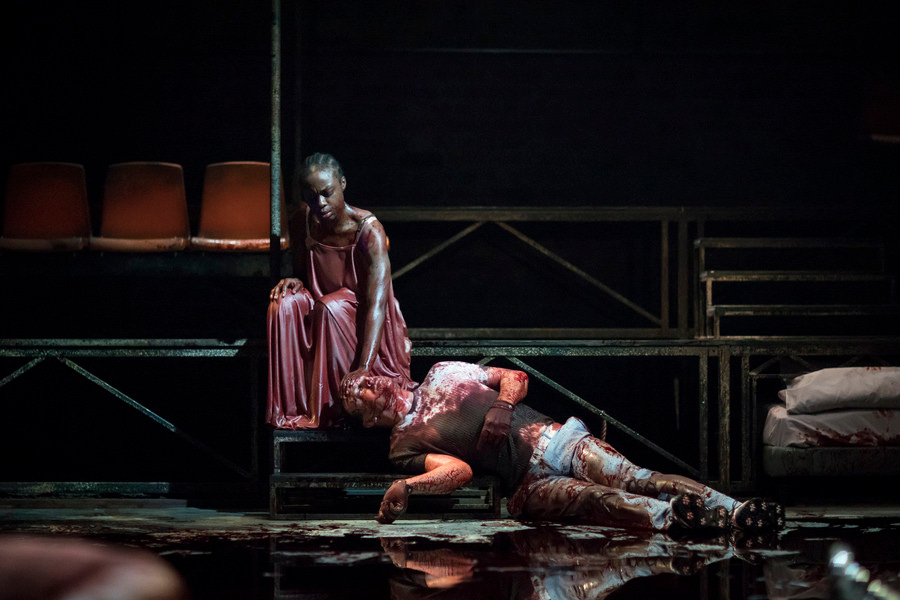Local and global: Maria Aberg on making migrant-led work with Projekt Europa
On a company celebrating and supporting migrant artists in the UK.
Welcome to Café Europa, a weekly newsletter dedicated to European theatre.
Hello to all those of you who have found your way here via Tarek Iskander’s kind words on Twitter/X. This newsletter is a mix of reviews, interviews, artist profiles, festival coverage and other stuff I think/hope will be interesting. So far this year I’ve covered work from Germany, the Netherlands, Portugal, Slovenia and Bulgaria, and published this long read on the making of Three Kingdoms. This week I’m talking to director Maria Aberg about her company Projekt Europa.
Here comes the awkward transactional part - if you find this newsletter interesting or valuable, please consider sharing it or, if you or your organisation are able, becoming a paid supporter. I recognise times are tight, so I also have a Ko-fi account, if you want to support my writing this way.
The pandemic - and its impact on the theatre industry - clarified certain things for Maria Aberg. She realised she had no desire to run an existing organisation in the UK. She’d previously thought that if a suitable opportunity came along, she might put herself in the running for a leadership position, but the way in which artists were, in effect, thrown under the bus during the pandemic so that organisations could survive changed her mind. “I just didn't agree with the way we run organisations in this country,” she says. If she was going to run something it would need to be on her terms. Aberg began to think about alternative ways of doing things, asking herself a number of questions. “If I was going to set something up on my own, what should it look like, what will the decision-making structures be like, and who should be involved.”
At the same time Aberg, who is Swedish, started to think of herself as migrant theatre-maker for the first time. “Of course, to some extent,” she says, “I’d always felt like an outsider, because you're working in a second language and you haven't gone to the same schools as everyone else, but I hadn't really put myself in that context.” However, while participating in town hall meetings arranged by Migrants in Theatre during the early part of the pandemic, her thinking on this began to shift.
“I was also starting to think about what it meant to be international in a time when travelling wasn’t possible. And, of course, there is plenty that is international within the boundaries of the UK,” she says.
International ambitions
Projekt Europa, the organisation that Aberg set up, is migrant-led and migrant-focused. It mixes audience-facing work, artist development programmes and community- based work, activism and advocacy.
The company has just completed a three-year residency at the Marlowe Theatre in Canterbury. In the second half of 2020, Aberg had been contacting everyone she knew in theatre, in international festivals, determined to get something off the ground. She reached out to Deborah Shaw, whom has recently started at the Marlowe and had “ambitions for how that theatre in that particular place [with its proximity to mainland Europe] might relate to the idea of internationalism.”
Current Projekt Europa projects include Desire Maps, a participatory performance made in collaboration with interactive theatre makers Coney, which invites audience members to reimagine the geographical journeys of their ancestors. “It feels like a project that in terms of company USP,” says Aberg,” really captures what we do.”
Punch, led by Lithuanian artist Ignė Barkauskaite, is a co-production with the Bristol Old Vic, will see them working in collaboration with a boxing club. They also have a project which they’re tentatively calling Songs of Solidarity, which is a music theatre project with refugee musicians from around the world that they’re developing in collaboration with DASH Arts.
In addition to these projects, the company also offers a co-commissioning scheme supporting migrant theatre makers to develop their work and Projekt Empower, a mentorship programme which aims to support migrant theatre makers at the beginning of their UK careers via one-on-one mentoring with artist including Tanya Moodie, Enda Walsh and Vera Chok.
In the longer run, one of things she’s hoping to do with Projekt Europa is create a database of migrant artists. “A massive searchable database that will help people find who they need when they need them and put an end to the conversations that those artists aren’t out there, or we don’t know how to reach them,” she explains.
“There’s an assumption that the networks we have for identifying talent are not biased in any way, which is kind of hilarious,” she adds. “We hope to open that conversation up.”
From the ashes
Projekt Europa was originally conceived as an ambitious season of work which Åberg was co-curating with the German dramaturg Judith Gerstenberg for the Royal Shakespeare Company, where she was an associate artist. Aberg was going to direct Europeana, based on the book by Patrik Ouředník, herself and the season was also going to include Barbara Frey’s production of Peer Gynt and Tiago Rodrigues’ production of Blindness and Seeing. A reaction to a post-Brexit cultural landscape that was starting to feel increasingly insular, it was thrillingly ambitious in its internationalism. and, as Aberg explained in this 2021 Guardian piece, “it was the culmination of years of interest and curiosity about European theatre-makers.”
The season was meant to kick off in April 2020, but for obvious reasons that did not happen. While the loss of all that work was initially devastating, Aberg was determined to channel some of the energy and research in other directions. So, at a time of shutdown and stasis, when movement was restricted, she decided to do what on the surface might have been deemed a very risky thing: to set up an international company. In this way, the new Projekt Europa emerged from the ashes of the old.
Blood, balloons and Dirty Dancing
After studying at Mountview in London, Aberg initially worked as a senior reader in the literary department of the Royal Court under Graham Whybrow. He ran a “very informal kind of directors training through the literary office,” she says and this led to a period assisting at the Royal Court, making her professional debut with FX Kroetz’s Stallerhof at Southwark Playhouse in 2006. She was invited to become an associate artist at the RSC, making her debut there with Roy Williams’ Days of Significance in 2007. “I found enormous freedom there. And I felt like I could work with the people I wanted to work with and explore the things I wanted,” she says.
Her 2012 production of King John was, and I believe this is the correct phrase, an absolute banger. Aberg took one of Shakespeare’s less-frequently performed plays and made it accessible and exciting and messy in the best way, all within an RSC frame. The show featured a wall of balloons, confetti, guns and blood, and a wedding scene in which the cast perform the ‘I’ve Had the Time of My Life’ sequence from Dirty Dancing in its entirety. (I remember sitting in the audience and feeling a sense of elation when the music started up and it became clear that they were going to do the whole routine).
“I could push it quite far with King John, which I think I did. And it's I still one of the happiest shows I've ever done,” she says. While there were some people who hated it, and others who were bemused by it, the people who loved it really loved it.
Aberg’s King John also featured inventive cross-gender casting at a time before this was commonplace, casting Pippa Nixon as The Bastard. “It started off with a curiosity about seeing a woman tackling what is, in a cliched way, a very masculine part," Aberg said in the Guardian at the time. "The Bastard is a classic independent warrior: irreverent, funny, aggressive. Our world contains women who are rude and strong and loyal, who are capable leaders and powerful in their own right. It's interesting to explore how men relate to them."
“The great thing about playing The Bastard is then when you are fighting for England versus France – it’s like a warrior or an Amazon comes out of you, and you suddenly feel like Joan of Arc,” Nixon said in this Exeunt interview at the time (I’d really recommend reading the whole thing as it’s illuminating both on Aberg’s approach to directing, some of the resistance that the production faced and where the conversation was on cross-gender casting at the time.)
Aberg continued to direct at the RSC, reuniting King John’s Pippa Nixon and Alex Waldmann in an As You Like It with a woozy, music festival vibe and music composed by Laura Marling. This was followed by a video-heavy production of John Webster’s bloody tragedy The White Devil and a production of Doctor Faustus in which the actors Sandy Grierson and Oliver Ryan shared the roles of Faustus and Mephistopheles, striking a match to see who would play which role on the night. (Faustus was played by the actor whose flame went out first.) In 2018, she staged a version of The Duchess of Malfi with Joan Iyiola in the title role that was so gore-soaked that protective blankets were doled out to the front row in the second half to shield them from splatter. (Here’s Michael Billington’s approving review).
In 2019, she directed Alice Birch’s [BLANK] for the Donmar Warehouse in a co-production with Clean Break, the company which makes work with and about women who have experienced the criminal justice system. Birch’s play consists of 100 scenes all in some way connected to the care and prison systems, intended to be performed in any order the direcyor sees fit. Maria Aberg’s version consisted of 27 scenes and featured a cast including Jemima Rooper and Kate O'Flynn.
Since the pandemic, Aberg has been partly based back in Sweden and has recently directed Tracy Letts’ August: Osage County at Malmo Stadsteater. What’s the biggest difference between working in the Swedish system and the UK? “There's more money,” says Aberg, which obviously has an impact on number of factors, including rehearsal periods, which tend to be longer. With August: Osage County, she had access to a full set and full technical support for several weeks, “which is magic.” Even more crucially the pay is “probably about four times as high as it is in the UK.” This significantly affects your how you arrange your working life, how much time you can invest in a project. “It basically means you can do two shows a year and be absolutely fine.”
What are her long term objectives for Projekt Europa? They are looking at expanding the work that they do outside the UK, both in terms of bringing practitioners to the UK, and also taking the work that they make outside the UK. Aberg also wants to hone the relationships they have with organisations in the UK, in order to build support for the migrant artists and the migrant communities in each place.
While her ambitions for the company are big, it’s the small moments of connection that provide reminders of why she set it up in the first place. She describes a weekly workshop programme they hold in Kent for refugees and asylum seekers who have no previous experience with theatre. A theatre practitioner from Syria who was living in temporary accommodation came along to the workshop, she says, and “being able to provide a little bit of connection between their past life and present situation was brilliant. It encapsulates what we do. It comes down to the individuals and their experience and, and what they bring to the room and how we can find a way to hold that and harness it, to nurture it in some way.”
This week in European theatre
A round-up of festivals, premieres and other exciting upcoming events over the next seven days.
Faust Gretchen Fraktur – Young director Lorenz Nolting helms an idiosyncratic take on Faust that features five iterations of Gretchen and maybe also Timothy Treadwell, the subject of Werner Herzog’s Grizzly Man documentary. It premieres at the Thalia Theatre in Hamburg on 26th April.
The Magic Mountain – In this new production by Michał Borczuch – who recently directed Argonauts at the Mladinsko Theatre in Slovenia –a group of people shut in their tenement during the Covid lockdown start reading Thomas Mann’s novel and fall under its spell. It’s an intriguing premise, linking Mann’s story of isolation with our recent experiences of the pandemic. It premieres at TR Warszawa on the 26th April.
Angel of Ice – Hungarian director Arpád Schilling’s new production sounds like it has all the makings of a thriller. A famous TV journalist packs in her job and starts working at a correctional home for girls and, in doing so, stirs up her own past trauma. Written specifically for the ensemble, it premieres at Zagreb Youth Theatre (ZKM) on 26th April.
Thank you for reading! You can contact me about anything newsletter-related on natasha.tripney@gmail.com








